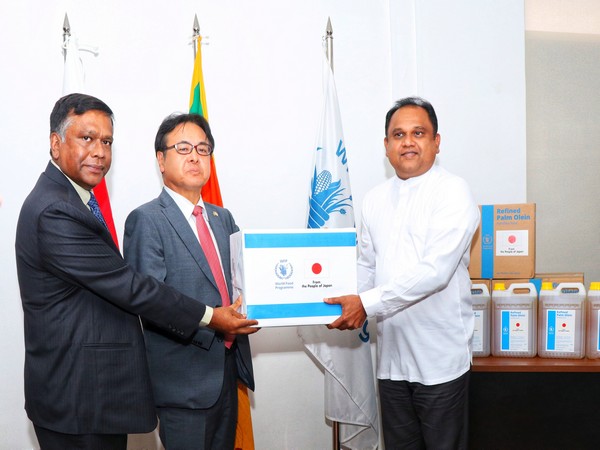

Sri Lanka, on Monday, received the first tranche of food assistance valued at USD 1.5 million from the government of Japan, which was provided through the United Nations World Food Programme (WFP).
The donation was a part of food assistance pledged by the Japan government earlier this year, to Sri Lanka, where more than 6 million people – nearly 30 percent of the population, are facing a worsening food crisis.
“The first tranche of food aid pledged by the Japanese government earlier this year, totaling USD1.5 million, was delivered today to the Ministry of Trade, Commerce and Food Security through the United Nations World Food Program,” tweeted WFP Sri Lanka.
Ambassador of Japan to Sri Lanka, Mizukoshi Hideaki handed over the donation to Nalin Fernando, Minister of Trade, Commerce and Food Security, in the presence of Abdur Rahim Siddiqui, WFP Representative, and Country Director, during a ceremony held at the Ministry of Trade, Commerce and Food Security.
This first tranche forms part of the donation consisting of rice, lentils, and oil, which will be distributed by WFP to approximately 15,000 people in both urban and rural areas and 380,000 school children, an official statement from World Food Programme (WFP) said.
Ambassador of Japan to Sri Lanka, Mizukoshi Hideaki said, “It is our great honour that we are able to handover the first tranche of essential food supplies today with the rapid procurement of WFP, which will be delivered to vulnerable families and children across the island who are facing extreme hardship, amidst prevailing food shortages and soaring food prices during this unprecedented economic crisis.”
“We sincerely hope that this humanitarian assistance will provide relief to all the people in need and help them meet their daily nutritional requirements,” he added.
WFP Representative, Siddiqui thanked Japan government for its contribution in the hour of need and said that it was one of the first to pledge support to WFP’s appeal.
“I thank the people of Japan for this timely contribution. The Japanese Government was one of the first to pledge support to WFP’s appeal. The donation will go a long way in addressing Sri Lanka’s growing food insecurity while shortages of food and other essentials and skyrocketing prices continue to impact millions of people’s ability to maintain an adequate and nutritious diet,” Siddiqui said.
A recent survey by WFP and FAO indicates that many of the households – over 60 percent – are resorting to coping mechanisms, such as reducing portion sizes and eating less nutritious food, which could aggravate the already-high malnutrition rates among women and children.
In response, WFP is mobilizing funds and support to provide emergency assistance to 3.4 million people, including 1.4 million people who are in dire need of emergency food assistance, through food, cash or voucher assistance as well as one million schoolchildren and one million pregnant and breastfeeding women by supporting the existing national social safety net programmes.
The country is ranked fifth among the 10 countries with the highest food price inflation in the world, according to the latest World Bank assessment. As of July, Sri Lanka had been experiencing significant shortages in the domestic food supply.
The World Bank said trade policy actions on food and fertilizers have surged since the beginning of the war in Ukraine. Countries actively used trade policy to respond to domestic needs when faced with potential food shortages at the beginning of the COVID-19 pandemic.
Agricultural production in the country decreased by 40 per cent to 50 per cent because of fertilizer shortages, and there is a lack of foreign exchange to purchase food imports.
UNICEF Regional Director for South Asia, George Laryea-Adjei recently warned that staple foods have become unaffordable in Sri Lanka as the island nation continues to suffer its worst financial slump since its independence.
In a statement issued on Friday, Laryea-Adjei also pointed out that severe malnutrition in crisis-wracked Sri Lanka was already among the highest in the region. The alert from the UN Children’s Fund comes as families continue to skip regular meals as staple foods become unaffordable.
UNICEF said that Sri Lanka’s emergency is a warning to other South Asian countries of the risk of not preparing for economic hardship.